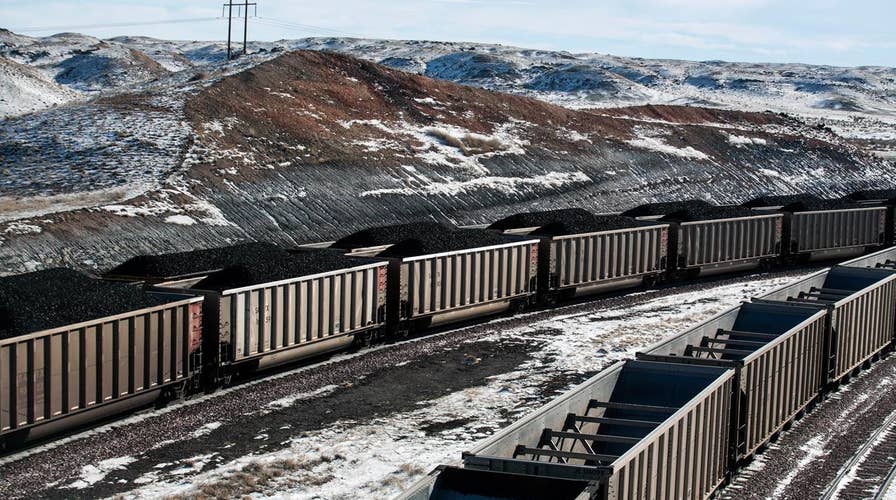Coal mining towns see hope for jobs after Trump action
Strategy Room: Joe Lestingi and Charmaine Yoest on the repercussions of the president's new executive order
MADISON, W.Va. – In West Virginia’s bucolic Boone County, there are scattered reminders everywhere of better days – a tattered American flag, dusty swing sets and metal chimes blowing in the wind.
A decade ago, this coal community was thriving. It led the nation in mining jobs, had a vibrant economy and was giving back to its people.
Then a wave of environmental regulations hit, along with an overall shift toward other forms of energy. Aimed at cutting out coal in favor of wind and solar, the changes had devastating effects on towns built around the industry.
SLIDESHOW: WEST VIRGINIA TOWNS SEEK COMEBACK
“It’s been heartbreaking,” Kris Mitchell, director at Boone County Community and Economic Development Corp., told Fox News. “It impacted every level.”
But communities like Boone are seeing new hope amid a renewed effort in Washington to peel back red tape and invest once again in coal.
"My administration is putting an end to the war on coal," President Trump said Tuesday as he signed an executive order aimed at rolling back Obama-era regulations.
MINE SAFETY BILLS FIRE UP TENSIONS IN COAL COUNTRY
“We’re optimistic and hopeful,” Chris Hamilton, senior vice president of the West Virginia Coal Association, told Fox News ahead of the announcement.
Hamilton, who started in the industry as a coal miner straight out of high school, said he’s seen renewed confidence and interest in West Virginia coal from the investment community. Since November, there’s been an uptick in pricing levels and growth in certain coal operations that he largely attributes to Trump.
After eight years of regulations, “we have to hang our hope on President Trump,” Hamilton said.
The future of the industry remains unclear. Democrats ripped Trump's executive order as bad for the environment and claimed it would not actually bring coal jobs back.
Indeed, while regulations have hurt the coal sector, experts say the industry's biggest hurdle is the abundance of cheap natural gas.
Gas prices have fallen, making it much more attractive than coal. Another problem is technology. As coal companies have gotten more efficient at extracting coal, fewer workers are needed. Coal’s presence in America’s power market has fallen to 32 percent from about 50 percent a decade ago.
The bottom line, experts say, is that even though the Obama administration did all it could to kill coal, it wasn’t those policies alone that choked the life from a once-vibrant industry.
Still, Trump's bid to ease regulations is boosting morale, giving coal-mining communities across Appalachia a shot at rebuilding.
“Everyone here is tied to coal,” Mitchell told Fox News. “It’s in your family. It’s in your blood.”
Mitchell grew up in Boone. Her father, now retired, was a coal miner. Her brother was in the industry. One grandfather worked on the railroad while the other worked in a deep mine.
Once the coal jobs started to dry up, employment plummeted and struggling workers were forced to flee the only place they had called home.
Today, there are boarded-up houses, burned-down lots and displays of deep decay.
But there are signs of hope.
The day after Trump’s White House win, coal stock prices soared and many coal communities celebrated what they saw as a comeback.
Hamilton says the Trump administration, coupled with a state legislature that has “demonstrated its interest in seeing coal remain a centerpiece of our state’s economy,” has set the stage for an “all-out attempt” to take advantage of this “once-in-a-lifetime opportunity to transform West Virginia into the nation’s capital for coal and energy.”
“It’s a good first step,” West Virginia Del. Rupie Phillips told Fox News. He added that the success of coal is dependent on Trump’s promise to bring back manufacturing jobs. That, in turn, he says will work toward driving a real coal revival.
U.S. coal production in 2016 hit its lowest level since 1978. The industry has been pummeled over the past eight years, and between 2011 and 2016, it lost about 60,000 jobs.
According to the Bureau of Labor Statistics, employment in Boone is down a staggering 81 percent over the past five years.
So can coal come back? In an age of not just surging natural gas production but developments in renewables like wind and solar, the big challenge is to find a way to become the cheapest and best product for the job.
Robert Murray, owner of the world’s largest private coal company, recently told The Columbus Dispatch that Trump’s victory lap might be a bit premature.
“Can the coal industry be brought back?” Murray asked. “The answer is, I’ve suggested to President Trump that he temper his expectations.”
Learning from painful lessons of the past, the plan forward for Boone – like for most of West Virginia – is to diversify.
There are big pushes for infrastructure reform and a strong coalition working to rebrand the region as a tourist destination.
“Tourism is a supplement,” Mitchell said.
Coal, though, will always have a home in Boone County.
Mitchell added, “We will always back coal here because it will always be a part of us. No one will ever give up on coal.”












































